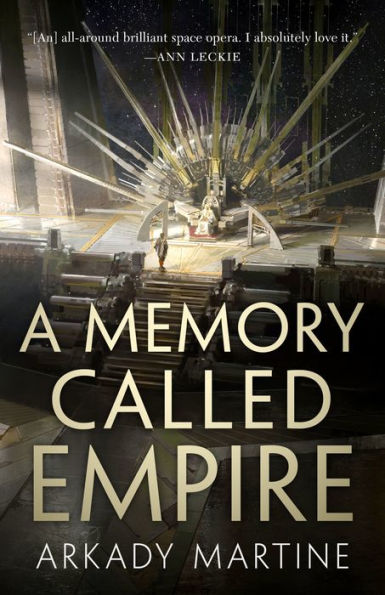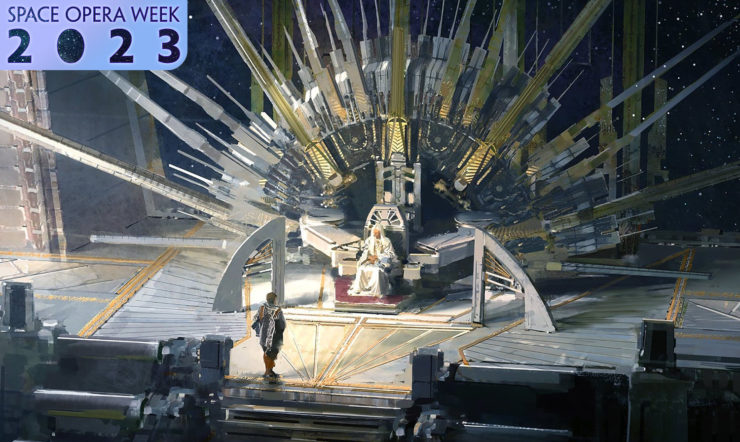Arkady Martine’s A Memory Called Empire is one of those novels that made me really, truly think about culture and empire—and cultural imperialism.
The story centers on political intrigue in the capital of Teixcalaan, a fictional galaxy-spanning empire based on Martine’s own scholarship of Byzantine culture, and in whose language the word for “world” is synonymous with the name of the empire itself. To exist in the world is to exist within the Empire, and A Memory Called Empire follows an outsider, Ambassador Mahit Dzmare, who adores this culture that devours, physically, culturally, ideologically—and which might well devour her own. Thus, this is a novel that is, at its simplest, about cultural imperialism: about how empire is sustained through the very language its citizens use to reinforce its worldview, and through art and literature and stories it tells about itself, both to itself and to others.
This is a refreshing approach. Space opera, as Charlie Jane Anders has written, has its roots in imperialism and colonialism; developing in the early 20th century, a time of the “flowering of the British empire,” it traces its lineage to tales of the exploration and conquest of an unknown frontier, with all the obvious baggage that entails. But, as Anders points out in that same article, starting with the success of James S.A. Corey’s Expanse series, we’ve seen a flourishing of a different kind of space opera, focused more on everyman characters—and, dare I say, at least in this particular case, on a critique of empire.
Thus, though Martine’s novel takes place in a fictional world, like all the best science fiction it elucidates the realities of our own: how narrative-making and language uphold empire by mythologizing its origins and imposing its values and conceptual frameworks —their very ways of perceiving reality—onto those they colonize. And after reading the novel, I looked on our world anew, finding many and varied resonances of Teixcalaan. This, then, is but a brief list of some of those resonances and a testimony to how prevalent and relevant empire and the themes of A Memory Called Empire are to this day.
The Aeneid – Vergil, trans. Shadi Bartsch
My Latin reading group has recently been reading book XII of The Aeneid, giving me a chance to delve into this epic that starts by proclaiming to sing of “arms and a man.” That man is Aeneas, the mythical founder of Rome, and the story itself is the empire’s founding myth—but a self-aware one. As Shadi Bartsch writes in the introduction to her recent translation, the Aeneid is “a story about stories (or national myths) and how they work. It is an epic that tells a story of foundation but puts on display the fault lines at the base of its own edifice, revealing the mechanisms at work in wholesome origin-stories and justifications of imperial aggression.” Even as Vergil constructs a story that would be mobilized as a national myth within his own lifetime, his epic meditates on the very construction of such myths and shows the fault lines within them—for example, in its climactic but abrupt ending scene, where the supposed hero and founder of Rome commits an act of harsh, unnecessary violence.
Aliens, Space Exploration, and Human Empire
Aliens have also been on my mind recently, not least because the James Webb telescope just completed its first full year in space, looking for, among other things, exoplanets that might be able to sustain life. And in the sequel to A Memory Called Empire, A Desolation Called Peace, Martine confronts the Teixcalaan empire with sentient aliens that are utterly incomprehensible, posing the question: If they’re not human, are they at least people?
Buy the Book


A Memory Called Empire
If we do find life elsewhere in the cosmos, however, it would challenge our most fundamental assumption: that we’re the center of the universe (metaphorically speaking). It’s a worldview neatly encapsulated by the “First Contact” episode of Star Trek: The Next Generation (not the movie), which introduces us to a planet of aliens (who are really metaphors for humans) and who, having developed warp drive and ventured into the cosmos, cannot accept the existence of aliens (humans, aka our protagonists) because to do so would challenge a central tenet of their belief system: that they’re the most important beings in the universe.
On our planet, this mindset manifests itself in an ideal articulated by Francis Bacon (yes, the “knowledge is power” guy) as the “triumph of human empire”: the idea that nature can and should be dominated through science and technology, and that such mastery is what renders human beings superior. (This has also, unfortunately, been the justification for actual empire, in the sense of subjugating not just nature and physical places, but also the people there). This is also why the famous “Earthrise” photo was so earth-shattering when taken by Apollo 8 astronaut Bill Anders in 1968: it showed Earth from a literally alien vantage point, one in which humans were not the center. There is no triumph of human empire when alien life is involved, and so while Perseverance is digging up cool rocks on Mars, we had better be prepared for what it might find.
“Why Do I Write in My Colonizers’ Language?” – Anandi Mishra, Electric Literature
On my way home from campus, where I had been teaching a course on the assumptions embedded within our academic institutions and disciplines, this essay text popped up in my suggested articles (thanks, all-seeing eye of Google). In the seminar, we had just finished discussing Gayatri Spivak’s foundational text “Can the Subaltern Speak?”—a text that you pretty much can’t get a humanities PhD without reading. A complex and almost byzantine (hah) article, it asks a crucial question: Can the colonized and oppressed really speak about their reality and the systems of power that create it if they must take on the language of Western empires to do so? It is a text within which I could not help but hear echoes of A Memory Called Empire, in which Mahit must gain fluency in the language, history, cultural and literary touchstones, and social practices of Teixcalaan to even be considered a person (and, Martine later confirmed that Spivak’s thinking made its way into the novel).
Similarly, Anandi Mishra writes powerfully about growing up and living in India, where English was “a language of access” to better career options and greater opportunities, seemed suited to this line of thought. Only now, in adulthood, did she begin rediscovering, and reading and writing in, Hindi.
Born to an erstwhile British colony, I have come to understand that heritage comes with burden of maintenance. And it has certainly not been easy for India to chart its own path after independence. Some of the more enduring legacies of the British Raj continue to form a big part of our identity and symbolize much of what is right and wrong with it.
As someone whose native language is also not English, but who spends most of her personal and professional life speaking it, Mishra’s words resonated. To me, there has long been a difference between English—the language of an empire, as well as the language I can wield most easily, like a sword with which I can cut a path forward, the one in which I am most expressive and erudite—and the language in which I feel, the one that is my own. And there is a certain irony, too, in the fact that the language that I feel most keenly in is the one that comes with a burden of maintenance, while English doesn’t, for English is a tool that stays sharp through the necessity of daily use in a world shaped by it.
What about you, dear reader? Where have you seen echoes of the themes and concerns of A Memory Called Empire? What experiences of empire and colonization have you found reflected in Teixcalaan? Which moments of the novel sparked a connection in you? Sound off in the comments.
Dr. Anastasia Klimchynskaya is a Sherlockian, a Trekkie, and a scholar of science fiction specializing in the nineteenth century. In addition to her writing (which includes a top-secret Jules Verne project – stay tuned!), she has appeared widely to speak about her work and the genre, including on the Rosenbach Library’s Sundays with Frankenstein program. Find her on Twitter @anaklimchy.










